
Treballs de Sociolinguistica Catalana
Scope & Guideline
Fostering Dialogue on Catalan Language and Culture
Introduction
Aims and Scopes
- Sociolinguistic Dynamics of Catalan:
The journal emphasizes the study of Catalan sociolinguistics, examining how language use reflects and influences social identities, power dynamics, and cultural practices within Catalonia and its diaspora. - Language Policy and Education:
A significant focus is placed on language policies, especially in educational contexts, analyzing how these policies affect language use, maintenance, and revitalization efforts in schools and communities. - Multilingualism and Language Contact:
The journal explores multilingualism, particularly in the Catalan context, studying the interactions between Catalan and other languages, including Spanish, Portuguese, and indigenous languages, as well as the implications of these interactions. - Linguistic Attitudes and Identity:
Research on linguistic attitudes, identity formation, and the ideologies surrounding language use is a core theme, focusing on how these factors shape individual and collective experiences within multilingual communities. - Revitalization and Language Maintenance:
The journal contributes to discussions on linguistic revitalization, examining strategies and challenges faced by minority languages, particularly in the context of Catalan, as well as the socio-political factors influencing these processes.
Trending and Emerging
- Translanguaging Practices:
There is an increasing focus on translanguaging, particularly in educational contexts, which reflects a shift towards understanding how speakers utilize multiple languages fluidly in their communication and learning. - Impact of Immigration on Language Dynamics:
Recent studies have emphasized the experiences of immigrant communities and their linguistic practices, highlighting the impact of migration on language use, identity, and intergenerational language transmission. - Digital Linguistics and Language Technology:
Emerging themes include the role of digital platforms in language use and policy, as well as the implications of technology on language learning and maintenance, reflecting the integration of digital contexts into sociolinguistic research. - Language Policy in Multilingual Contexts:
Research on language policy, especially concerning multilingual education and its effects on language maintenance and identity, has become more prominent, indicating a growing interest in how policies shape linguistic landscapes. - Linguistic Attitudes and Ideologies:
There is a notable trend towards exploring linguistic attitudes and ideologies, particularly concerning minority languages and their speakers, as researchers seek to understand the societal impacts of these perceptions.
Declining or Waning
- Historical Linguistic Studies:
Research focusing on historical aspects of the Catalan language, such as its development and historical usage patterns, appears to be less frequent in recent publications, indicating a possible shift towards more contemporary sociolinguistic issues. - Language and Tourism:
The intersection of language and tourism, while still relevant, has seen fewer focused studies compared to previous years, suggesting a waning interest in this aspect of sociolinguistics within the journal. - Language and Gender Studies:
Although gender remains an important topic, specific studies examining the intersection of language and gender in detail have decreased, possibly indicating a broader integration of gender perspectives into other sociolinguistic themes rather than standalone studies.
Similar Journals
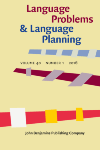
Language Problems & Language Planning
Advancing Insights into Language Dynamics and PlanningLanguage Problems & Language Planning is a pivotal scholarly journal published by John Benjamins Publishing Co, renowned for its contributions to the fields of linguistics, communication, and language studies. With an ISSN of 0272-2690 and an E-ISSN of 1569-9889, this journal has been a cornerstone of academic discourse since its inception in 1977 and will continue to serve as a vital resource until 2024. Currently, it holds a respectable position within the Q3 category in both Communication and Linguistics and Language, reflecting its significant impact in these areas. The journal focuses on the intersection of language-related challenges and planning, addressing critical issues that affect societies worldwide, making it essential reading for researchers, policymakers, and students alike. Although it does not offer Open Access options, its articles provide valuable insights supported by a rigorous peer-review process, fostering a diverse dialogue among scholars and practitioners. Recognized in the Scopus rankings, Language Problems & Language Planning offers a platform for original research and theoretical discussions that advance understanding of language issues in a globalized world.

NEUPHILOLOGISCHE MITTEILUNGEN
Fostering Academic Excellence in Linguistic ResearchNEUPHILOLOGISCHE MITTEILUNGEN, published by the esteemed Modern Language Society, stands as a significant contribution to the domain of Language and Linguistics. With a history dating back to 1971, this journal has consistently provided an academic platform for researchers and scholars, navigating through the intricacies of philology and linguistic studies. Although it is indexed in Scopus with rankings reflecting its position in the Arts and Humanities and Social Sciences categories, it currently does not offer Open Access, which may require interested parties to seek institutional access for its wealth of content. The journal has experienced periods of coverage discontinuation in recent years, yet it remains a valued source for advancing the understanding of language theories and linguistic practices. Its location in Helsinki, Finland, offers a unique European perspective on global linguistic issues. The journal is ideal for those looking to engage with evolving linguistic trends and contribute to contemporary discussions in the field.
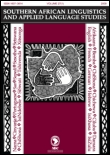
Southern African Linguistics and Applied Language Studies
Navigating Language Dynamics in a Diverse RegionSouthern African Linguistics and Applied Language Studies is a prestigious journal dedicated to the exploration and analysis of linguistics and applied language studies within the Southern African context. Published by Taylor & Francis Ltd, this esteemed journal has established itself as a significant platform for scholars and practitioners since its inception in 2003. With an impressive Q2 ranking in the Linguistics and Language category and a current Scopus rank of #430 out of 1167, it occupies a vital position in the academic landscape, appealing to a diverse readership keen on linguistic research, language policy, and applied linguistics. While the journal is not currently open access, it provides comprehensive insights and scholarly articles that foster understanding and innovation in linguistic practices and language education. As of 2024, the journal continues to deepen its impact through rigorous peer-review and a commitment to advancing knowledge, making it a key resource for researchers, educators, and students seeking to navigate the complexities of language within the Southern African region and beyond.

Language Dynamics and Change
Unraveling the Threads of Linguistic TransformationLanguage Dynamics and Change is a premier academic journal dedicated to exploring the evolution, variation, and transformation of languages over time. Published by BRILL, a reputable name in scholarly publishing, this journal aims to provide researchers, professionals, and students with a robust platform for disseminating cutting-edge findings in the field of linguistics. With an impressive Q1 quartile ranking in the Linguistics and Language category and a commendable ranking of #170 out of 1088 in the Arts and Humanities sector, it occupies a significant position in the academic landscape, showcasing innovative research that fosters a deeper understanding of language dynamics. Although it does not currently offer open access, the journal is committed to enhancing accessibility through various distribution channels. As we look ahead to its convergence period extending until 2024, Language Dynamics and Change continues to affirm its status as a vital resource for advancing the study of language evolution worldwide.
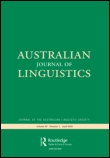
Australian Journal of Linguistics
Fostering Insightful Discourse in LinguisticsThe Australian Journal of Linguistics, published by Routledge Journals, Taylor & Francis Ltd, stands as a distinguished platform in the field of linguistics, fostering rigorous academic discourse since its inception in 1981. With an ISSN of 0726-8602 and an E-ISSN of 1469-2996, the journal has achieved a notable Q2 ranking in the linguistics and language category for 2023, indicating its quality and relevance within the academic community. With a Scopus ranking of #316 in Arts & Humanities and #373 in Social Sciences, it sits in the 71st and 68th percentiles respectively, underscoring its impact in the fields it encompasses. The journal aims to publish high-quality research articles that contribute to the understanding of linguistic theory, sociolinguistics, and applied linguistics, making it an essential resource for researchers, professionals, and students alike. The journal is based in the United Kingdom, at 2-4 Park Square, Milton Park, Abingdon OX14 4RN, Oxon, England, and actively encourages contributions that can expand the current linguistic discourse, reinforcing its commitment to highlighting diverse perspectives in language research.
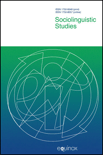
Sociolinguistic Studies
Bridging Disciplines Through Language InsightsSociolinguistic Studies, published by EQUINOX PUBLISHING LTD, is a premier academic journal dedicated to advancing the understanding of language in its social context. With an ISSN of 1750-8649 and an E-ISSN of 1750-8657, this journal plays a vital role in the fields of linguistics, sociology, and political science, offering a platform for interdisciplinary research that bridges diverse theoretical frameworks and methodologies. Since its inception in 2008, the journal has remained committed to publishing high-quality research that contributes to the critical engagement with sociolinguistic phenomena globally. With a categorization of Q3 in both Linguistics and Language and Sociology and Political Science as of 2023, and notable Scopus rankings reflecting its intellectual contribution, Sociolinguistic Studies is essential for researchers, professionals, and students aiming to explore the intricate relationships between language, society, and identity. Although open access is not currently available, the journal's scholarly impact continues to grow as it shapes contemporary discussions in sociolinguistics through rigorous peer-reviewed articles.
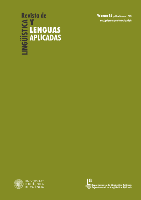
Revista de Linguistica y Lenguas Aplicadas
Advancing the Frontiers of Linguistic ResearchRevista de Linguistica y Lenguas Aplicadas, an esteemed journal published by UNIV POLITECNICA VALENCIA, EDITORIAL UPV, is a pivotal resource in the field of linguistics and applied languages. Since its inception, the journal has embraced Open Access publishing since 2006, ensuring that its rich repository of research is readily available to a global audience of researchers, academics, and language professionals. Headquartered in Valencia, Spain, the journal contributes significantly to the advancement of linguistics knowledge, boasting a respectable ranking within the Q3 quartile for Linguistics and Language (2023) according to Scopus metrics. It covers a diverse range of topics and methodologies, engaging readers through its commitment to scholarly rigor and innovation. The journal is uniquely positioned to inform and inspire essential discussions from 2015 to 2024, making it a vital platform for emerging linguists and seasoned scholars alike, as they explore the evolving landscapes of language and communication.
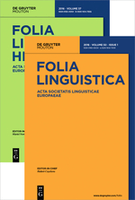
FOLIA LINGUISTICA
Exploring the Depths of Language and ThoughtFOLIA LINGUISTICA, published by WALTER DE GRUYTER GMBH, is a premier scholarly journal dedicated to the field of linguistics. Established in 1967, the journal has consistently provided a platform for innovative research and scholarly discourse in language and linguistics, contributing significantly to the academic community's understanding of language structures, usage, and cognitive processes. With its classification in the top quartile (Q1) of linguistics and language in 2023, FOLIA LINGUISTICA holds a respectable rank (#282/1088) within the Arts and Humanities category and an admirable percentile rank of 74th, ensuring its position at the forefront of linguistic scholarship. Researchers and academics from around the globe can access a wealth of knowledge and cutting-edge research findings through this esteemed publication, which is vital for anyone looking to engage with the latest advancements in linguistics. Located in Berlin, Germany, FOLIA LINGUISTICA encompasses all aspects of language research, making it an indispensable resource for researchers, professionals, and students alike seeking to deepen their understanding of language and its complexities.
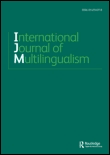
International Journal of Multilingualism
Fostering dialogue across diverse linguistic landscapes.Welcome to the International Journal of Multilingualism, a leading platform dedicated to advancing the field of linguistics and language studies. Established by ROUTLEDGE JOURNALS, TAYLOR & FRANCIS LTD and housed in the United Kingdom, this journal has rapidly ascended to a prestigious Q1 quartile status in both the Linguistics and Language categories as of 2023, ranking in the top 4% across related disciplines. With a remarkable Scopus ranking of #35 in Arts and Humanities and #38 in Social Sciences, it is recognized for publishing high-quality, impactful research that spans a diverse array of multilingual topics. The journal thrives on its commitment to examining the complexities and dynamics of multilingualism in contemporary society, making it an essential resource for researchers, professionals, and students alike. Although Open Access options are not currently available, the journal's rigorous peer-review process ensures that each publication contributes valuable insights into the field. Since its inception in 2004, the International Journal of Multilingualism continues to foster academic discourse and innovation, solidifying its role as a crucial outlet for scholarly work by 2024 and beyond.
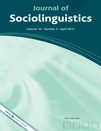
JOURNAL OF SOCIOLINGUISTICS
Unraveling the Complex Tapestry of SociolinguisticsThe Journal of Sociolinguistics, published by Wiley in the United Kingdom, is a leading interdisciplinary journal that explores the intricate relationships between language and society. With an impressive impact factor reflecting its Q1 quartile ranking in Histories and Philosophy of Science, Linguistics, Philosophy, and Sociology, this journal is recognized for its scholarly contributions, making it a vital resource for academics and practitioners in these dynamic fields. Covering a wide scope of topics from language variation and change to sociocultural dynamics, the journal has converged from 2004 to 2024, ensuring a comprehensive understanding of contemporary sociolinguistic issues. Although operating under a traditional access model, the Journal of Sociolinguistics remains pivotal for advancing critical dialogue and research for professionals, researchers, and students invested in linguistic and sociological studies.